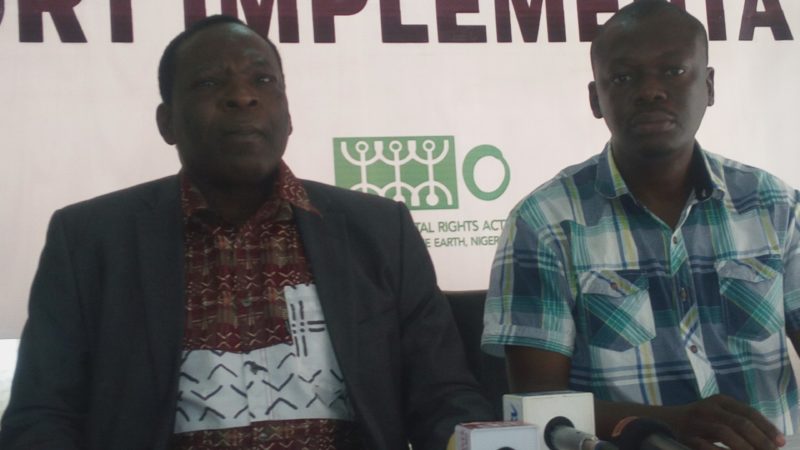Over five years after the United Nations Environment Programme (UNEP) recommended that Ogoniland in South-South Nigeria should be cleaned of the last drop of spilled oil, not a single drop has been removed from the beleaguered community.

Executive Director of Environmental Rights Action/Friends of the Earth Nigeria (ERA/FoEN), Dr. Godwin Ojo, disclosed this at a press briefing on the issue on Tuesday, April 4, 2017 in Lagos.
The United Nations Environment Programme (UNEP) released its Environmental Assessment of Ogoniland in August, 2011. The report, delivered to the Federal Government, recommends to the government, the oil and gas industry, and communities to begin a comprehensive clean-up of Ogoniland, restore polluted environments and put an end to all forms of oil contamination in the region.
The clean-up is expected to last 30 years, from 2011. Initial $1 billion was to be released by Shell Petroleum Development Company (SPDC) for the project.
However, no verifiable effort was made in that line until 2015 when President Muhammadu Buhari promised to start the implementation of the UNEP report.
“It took exactly five years after the report was submitted to the Federal Government before acceptance of responsibility by Shell Oil Company and the Federal Government. With pressure from civil society groups, the clean-up exercise proper was flagged-off in 2016 in Bodo City, Rivers State, by Vice President Yemi Osinbajo.
“The expectation that greeted that ceremony, which had the Ogoni people and hundreds of civil society groups in support, has however dimmed barely a year after, as the promised clean-up exercise is still bogged down in bureaucracy and controversies. The plan for the clean-up is still shrouded in secrecy and has not been formally subjected to public scrutiny.”
ERA added that, even with the inauguration of the Governing Council to provide for an institutional framework to drive the process, no verifiable progress has been made as, according to the organisation, “not a drop of oil has been cleaned from Ogoni”.
Again, ERA fears that “Shell is bound to compromise the process, if it continues to be a member of the Governing Council with oversight functions for the clean-up of its own mess”.
While these go on, the environment and people of Ogoni are at the receiving end. They suffer impoverishment and misery, says the activist.
In November 1995, Kenule Saro Wiwa and eight other members of Movement for the Survival of Ogoni People (MOSOP), who were fighting against the degradation of Ogoniland, paid the supreme price, when the military government led by General Sani Abacha took them to the gallows. Even till date, people of the area drink benzene-polluted water and farm on hydrocarbon-soaked soil, according to Ojo.
To “add insult to injury”, he adds, “the pre-clean-up emergency relief measures recommended by UNEP such as access to clean water, rather than the benzene-polluted water sources they rely on, has not been addressed. Similarly, healthcare delivery and compensation for lost livelihoods continue to suffer neglect and inaction. Poverty is rife in Ogoni and the life expectancy of the people (reportedly put at 41 years) now considered the shortest in Nigeria.”
ERA said that as the clean-up remains in limbo, damning disclosures of wilful exposure of oil-producing communities to hazards continue to mount against Shell which, says the group, “continues to operate with impunity in the Niger Delta”.
“The most recent is from Kay Holtzman, a leading oil spill expert previously employed by Shell Nigeria. Holtzman revealed that Shell tried to conceal data on the potential health effects of its oil spills on Bodo community. Shell had lied to the court in the Bodo versus Shell case held in London and had no option than to withdraw the case for an out-of-court settlement for $83 million,” Ojo said.
ERA’s demands
In view of the foregoing, the Federal Government and relevant agencies are mandated to, among others:
- Draw up and publish firm timelines through a participatory and transparent process, and publicise the step-by-step of the planned implementation of the clean-up process in conjunction with all interested parties.
- Abrogate or amend the HYPREP (Hydrocarbon Pollution Remediation Project) gazette to provide the legal backing to the clean-up process. To this end, (they should) establish the Ogoni Environmental Restoration Authority as a means of empowering the Ogoni as recommended by the UNEP report.
- Commence emergency relief measures and ensure the clean-up process is comprehensive, including environmental remediation such as biodiversity restoration, and compensation for loss of livelihoods.
- Set up a new structure called Technical Partners Unit headed by UNEP and other interested institutions with expertise in complex multi-disciplinary clean-up process.
- Empower NOSRA (National Oil Spill Environmental Agency) that currently lacks the capacity to detect spills, to be able to conduct proper clean-up process, or monitor clean-up independently through the joint investigation visits currently dominated by the oil companies.
- While the UNEP report had recommended a $1 billion initial restoration fund for Ogoni, ERA/FoEN recommends $100 billion clean-up and restoration fund to cover the entire Niger Delta. This will pave way for conflict resolution in the Niger Delta.
